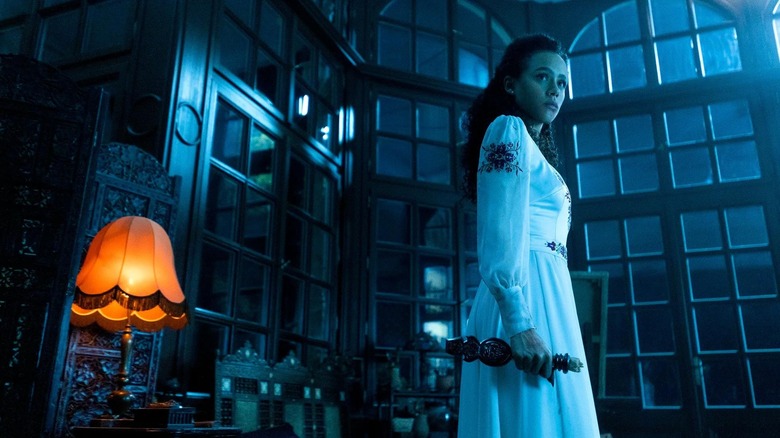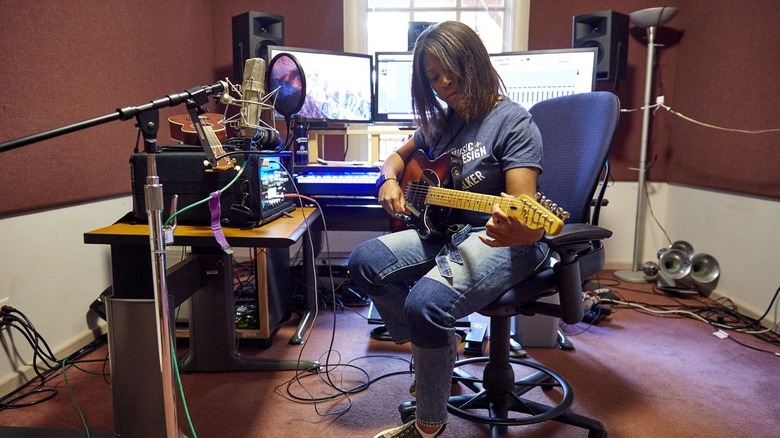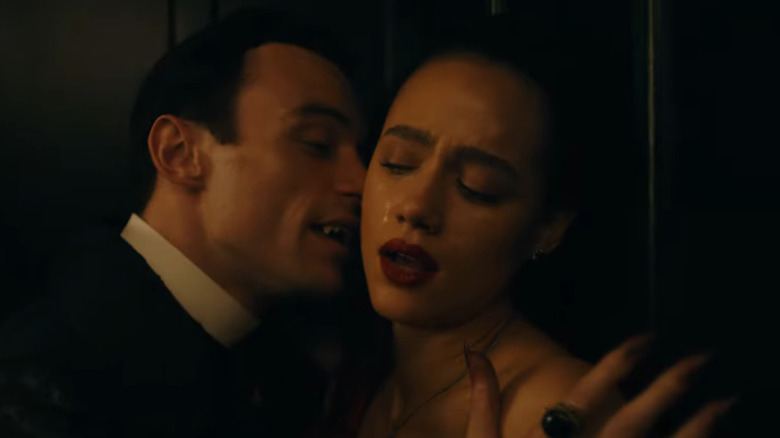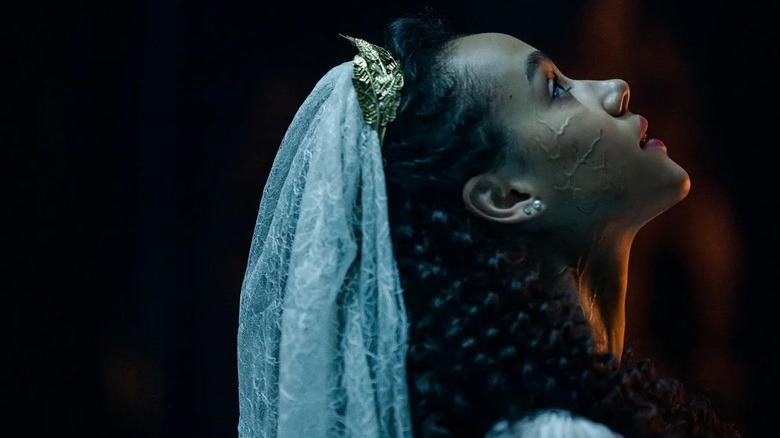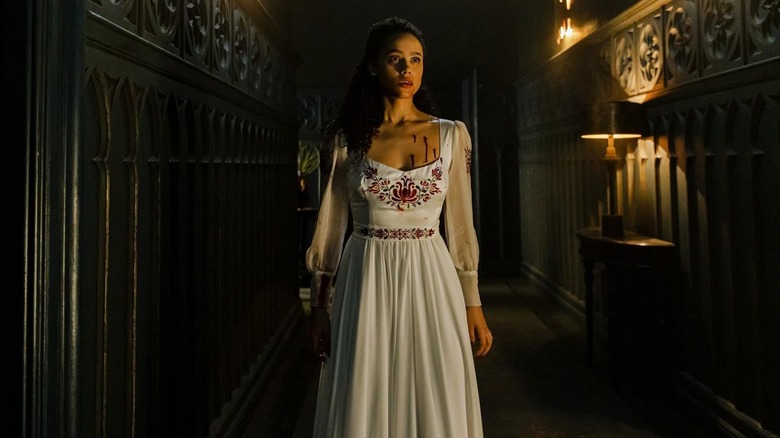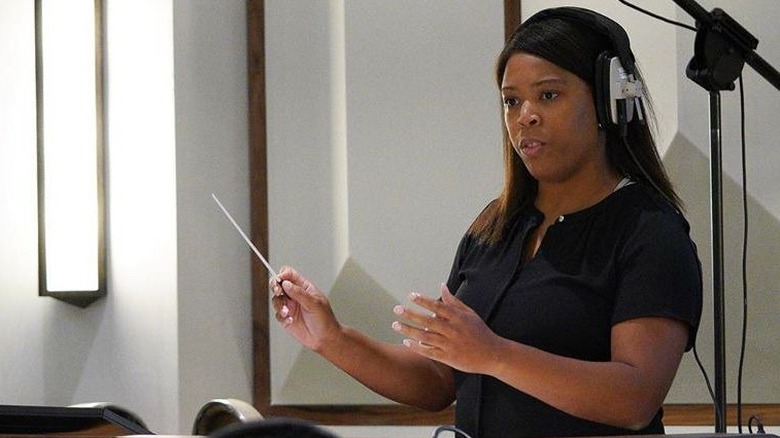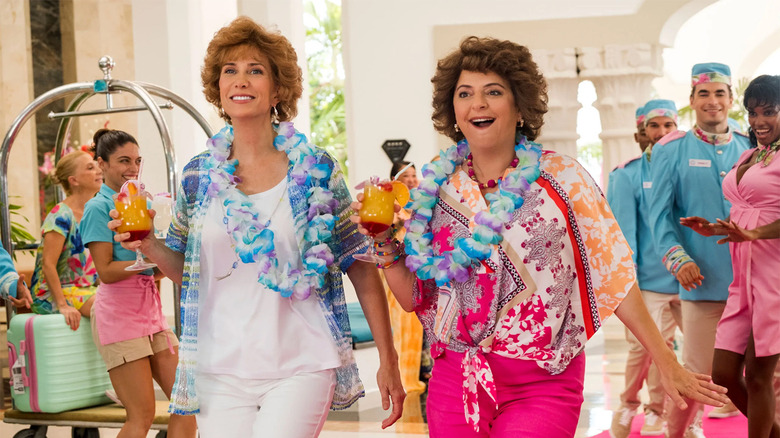The Invitation Composer Dara Taylor Wants To Unsettle With The Unfamiliar [Exclusive Interview]
Dara Taylor's score for "The Invitation" leaves a lot to the imagination. She wants listeners to ask, "What is that sound?" That question arises right at the beginning of her score for Jessica M. Thompson's horror movie, when a deranged, reversed choir comes and goes. It's one of the many recurring motifs in this score, almost a painful chant or plead for help that, in the end, turns triumphant in a 10-minute track for the finale.
According to Taylor, she was always encouraged by Thompson to think outside the box. She wanted to strike a balance between modern horror and classic gothic romances, and she did it with some surprising techniques. Recently, the composer behind "The Tender Bar" and co-composer of "Barb and Star go to Vista Del Mar" told us all about how she wanted to make an audience squirm in their seats with "The Invitation."
'It'd been a few years since I've done horror work, so it was fun to see where I am now in that aspect'
You're in your studio now. Even when you work on new scores, do you look back and think about your previous work?
I think mostly what I do is I take each experience and I apply it to the next one, especially when it comes to storytelling, or political things, or changes in picture, and why this change, and who asks for the change, and all of those things. I take each experience from place to place. But yeah, other than in instances like this, where you have to kind of digest what you did, I like to leave them in the past and see what I can do new. There's a reason why I do more film music than concert music, because I'm like, "Now this is done. Let's move on to the next thing."
So what would you say was your takeaway from the "The Invitation" experience?
It'd been a few years since I've done horror work, so it was fun to see where I am now in that aspect. I've done a lot of comedies and some dramas and docs and animation of late. It's probably been about five years since I've done any horror work, so just seeing what my 2022 voice in horror is versus my 2017 voice in horror.
Audiences have expectations of a horror movie score. Musically, how much can you deviate and experiment with genre?
We've talked a lot about just finding things that made us feel unsettled, and I think that lent itself well to this film. There's a lot of atmosphere. How creepy do we want to be at any particular part in the film? Do we want to be ahead of Evie's character? Do we want to be with her? Towing that line of where the thrills are, where the Gothic elements are, where the romance is, but still finding ways to tie them all together, so they all feel like a one cohesive piece.
For the Gothic romance elements, which instruments did you want to evoke that feeling?
Well, for the romance we did a lot of acoustic guitars and harps and things like that, in addition to more string pads. And then, when it came to scoring Gothic things, we'd bring in some higher mid strings. But then it always had this extra feeling of oddness, so bringing in some strange electric cello sounds, or processed vocals, or other things where you had to go, "What is that?" — which is my favorite question.
I have one of those questions. In the opening track, there's this sound like a disturbed choir mixed with wind almost. What is that?
It was a vocal. It was three vocalists that we had, and they come back and forth in various forms, or were singing that same motif in different parts of the film, kind of as this hypnotizing siren song. It's vocalists, but it's reverse vocal. They sang it one way and then I reverse them, and then added on a bunch of distortion and fuzz and things that should really just be on punk rock guitars, to really make it feel unsettling. And then, sometimes adding a little bit of that even onto the orchestra, just to make it feel odd, familiar but not comfortable.
'I've listened a lot to my dishwasher, which has a really good beat'
You always want to be bold with your choices, so was that one of the bolder choices in your mind?
I think definitely the vocals were one, and that was something that Jess had also mentioned that she wanted to kind of lean into. Because I feel like a lot of times people are okay with the idea of vocals, but sort of in the background, or as a pad or something like that. But we not only made them prevalent in volume, but prevalent in processing. So they are a lead instrument and not kind of a texture or a color. Then you're able to find the different textures and colors within those things.
I studied voice, so voice is my instrument. So it felt really great to kind of go back home in a weird way and work with that. But there are also just different sounds, different mouth sounds, and breathing, and a whistle that doesn't sound like a whistle by the time that I'm done putzing around with it. It was just a lot of fun experimentation in that way. And then, just finding instances where it could have just been a pad, but it's not, and finding different ways to make those things.
There was one time I was working on a queue, and at first, I thought something was still playing, and then I pressed pause. I'm like, "No. That's not coming from my rig. Where is that coming from?" I went downstairs, and my boyfriend was sanding something in the garage. So I'm like, "Do that again." Then I put down my phone, and I recorded him, and then I brought it back up. Because, there's also this feeling of making things, and there are a few kind of found pottery sounds that have been affected, and scraping, and that sort of thing. I don't know, just making, I think the French call it musique concrete, which is just finding music out of anything. I was really fortunate to be able to kind of play around with that as well.
Does that often happen, like, you're out and about and hear a sound and think, that's music?
Yeah, I've listened a lot to my dishwasher, which has a really good beat sometimes, or it's got this two against three thing. I think I'm always kind of cognizant of cool sounds around me, whether or not I capture them or just think about them and move on. Depends on if I'm driving or not. [Laughs]
'There's definitely a mad experimentation phase'
You said sometimes people are okay with vocals, as long as they're in the background. Why do you think that is?
I think sometimes it feels like it's bringing too much attention to itself, or maybe sometimes, to some people, vocals sound too sincere. It could be a variety of things. They're not right for every project, even though I do use a lot of them. Sometimes it's just finding the moments or finding the right project to feature them, rather than use them as a texture or a color.
How do you distort some of the sounds you were talking about, like breathing or whistling?
There's a lot of distortion plugins. Sometimes I run things through my Kemper amp and kind of re-amp them. Sometimes it's finding the effect chain first, like for [breathing in and out], and then recording it that way. Sometimes it sounds sillier if you don't have that in place. Yeah, just finding a lot of unsettling sounds.
So a bit of mad experimentation?
I think there's definitely a mad experimentation phase. And then, as we watch stuff, I might point to something and say, "Well, that sound is actually this thing." Or sometimes, Jess will ask, "What is that?" Or she'll comment on a weird sound that she likes if she'd like to put in other places. I think one thing we had talked about pretty early on was, oh boy, it was an insect sound or something. Oh, no, it was lizards and geckos, the sounds that they make, and what things will be used by sound design, and ways that we can either mirror that or stay away from that.
What'd you think of the final mix? How the score plays with those sound effects?
I think we did a pretty good job. We kind of worked in tandem, but I think they probably sent stuff over to them for them to work around. It was also fun to hear, in the final mix, things that they might choose to filter more, because there's a whole other side of that creative process when it comes to actually putting it all together, where to lean more into score versus sound effects. How much do we want to hear this pounding or a tonetic sound, or kind of let all the dialogue wash away, and just be enveloped in sound and music?
'There's just some intangible quality that reversing the vocal has that makes you feel unsafe'
What about silence in horror? How do you know when not to score a scare?
I think, especially, moments when you're not sure what's going to happen. Sometimes reactions are good in silence or leads to filtering things out. So you want that raw reaction. I think a lot of that, especially in this movie, are moments of a lot of emotional tension as well and not wanting to be overwrought in that, letting those moments speak for themselves.
You do go big with a final, 10-minute track for the climax. Where do you begin when composing a piece that big for a finale?
It's one of those things. Yeah, on a key sheet when we spot, that's probably six cues. I think it was four and 45-50. So it was four different queues, four different temp cues, into one thing. I kind of try and see things in terms of scenes. Where is this emotion starting and where is it ending? Then running with it.
Were there certain themes or ideas you wanted to pay off in that 10-minute track?
Yeah, because I have moments where I sort of quote Walt's theme or the theme of the manor. That's kind of the more Gothic thematic material in earlier cues. I wanted to lean into that a little more during this and have that played throughout his speech, and in the end, really, really tie it to him and his motives, more so than in previous scenes. It brings back a few themes with Viktoria and Lucy and other people. It's really a culmination of basically every thematic idea I had up to that point.
What about Evie's theme?
I think a lot of that is it starts off more tentative and sweeter. By the end, it's very deliberate and repeating, and it goes from an acoustic guitar in the beginning to a distorted string sound by the ending track there. It just repeats over and over again.
Why do you think strings are so effective in horror?
It probably has something to do with the harmonics that kind of pop out more from the string tone. Again, anytime you take something that can be familiar, but take away all the comfort, you're leaving this void, whereas you should trust this, but I don't. So I think maybe that's what it is. I think reversing the vocals has that same effect too, where I could have just done the same line and [played] it forward. But there's just some intangible quality that reversing the vocal has that makes you feel unsafe.
'Both in animation and in horror, you can be the loudest version of yourself'
What would it sound like if you did the Led Zeppelin thing where you tried to reverse the reverse vocals? What would we hear?
It would be a tritone in the other direction, because it always has this fall off at the end in what to hear. I think the first 10-15 minutes of the session, because it comes back so often, was just having the vocalist really nail this one thing. How much scoop they should put in at the beginning and how long they should last? We want it to feel like it's growing in volume, so they have to start louder and then they end — a lot of kind of counterintuitive things for the effect. So we try a version where we're like, "Okay. Now, let's reverse it." I have my engineer reverse it. Okay, so now, let's hold this a little longer, and then make the slide-in a little longer and bolder." It's really finding the perfect performance that will never be heard exactly as it was formed.
When you're working with vocals, do you write music responding to the vocals or the other way around?
I was a vocalist, but I think it depends on, I guess, how prevalent it was. For this, I started with vocals and then went around it, versus other projects where the vocals might be added in to bolster the orchestra. This way, this time around, a little bit of orchestra was added in to support the vocals.
In regards to timing, do you find a lot of similarities between scoring comedy and horror?
Yeah, absolutely. I compare horror to comedy a lot, because of that timing. Every frame matters, and [that's the same in] animation. I think both in animation and in horror, you can be the loudest version of yourself, because they're both sort of reactive. I think you're able to experiment more, and there's more room to, I'm going to say, be silly, but being silly in animation is tantamount to being bold in horror. It's just starting off by writing from your gut and seeing what happens.
'There was just a lot of playing with island elements, but also ridiculous bad guy action...'
For your work in animation, and I'm very sorry you had this experience, but you scored "Scoob!: Holiday Haunt." They still went ahead and recorded your score. I've never talked to a composer in that situation. Will we ever hear your work for that movie?
I don't know, which is really all I know. Yeah, it was an unfortunate situation. I had a really great time working with that team. They were also a team that really encouraged you to just be bold about something. It was a fun project to work on.
I'll end on a bright note and just say that I absolutely love "Barb and Star Go to Vista Del Mar" [seen above]. It's so joyful. Do you mind sharing any memories from your experience scoring that film?
It was a lot of fun. Again, I do enjoy having as much fun as possible on a new project, because otherwise, why are we working on this? But that was actually my first pandemic project. All recording was done remotely. All meetings were done remotely. So that also has a salient impression of the experience, but because everything else was so joyful, I feel like that part of it will fade away. But no, again, it was fun. There was a lot of playing with that, because I co-scored that with the Christopher Lennertz, and there was just a lot of playing with island elements but also ridiculous bad guy action again. And again, just trying to match them in their ridiculousness and their absurdity by being as straight with it as possible.
"The Invitation" is now playing in theaters.
